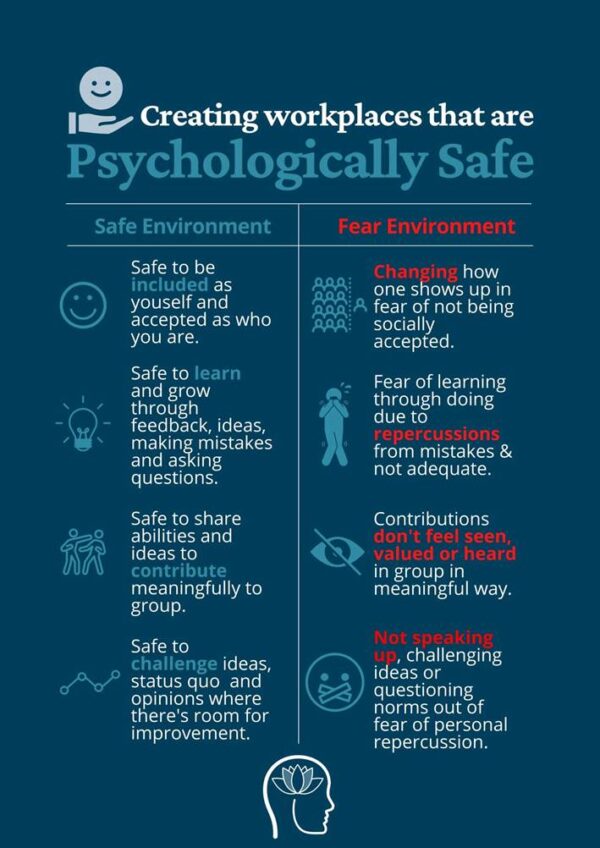My friend, John Wettstein (Safety John), has made his career supporting business leaders to create safe workspaces. His perspective seems to be focused on honest open communication about processes, risks, incidences, and improvement. Blame doesn’t fit his style.
He shared a pictogram comparing a psychologically safe work environment to an un-safe environment. I notice the similarities between a workplace/business and a home environment. Regardless of where you are or what you do, the foundation of success is feeling safe in the relationships.
This is not new to us. We continually work with couples to implement effective business principles in their relationship, and psychological safety is critical. An unsafe home environment instils fear. Fear always divides as it reduces trust. That leads to deeper “not-love” or psychologically unsafe feelings.
What about you?
Being totally honest with yourself, which side of the pictogram is most like the environment you have in your home? How closely do these points relate to how you and your partner interact?
What can you take from this to strive for even greater psychological safety in your interactions?

My interpretations
Be yourself – Acceptance
My belief is that you and your partner are totally OK just the way you are. You are not broken. You don’t need to be fixed.
Rather than focusing on weaknesses and faults, I invite you to notice the abilities, talents, and all other attributes you love and admire about your partner. Write them down and make the list as big as you can. Here is a tool to do that.
What might happen if you verbally shared those things with your partner? How would you feel about doing it? What affect might it have if you both did this regularly?
Learning – mistakes and constructive feedback
Change is inevitable in life. Adapting to change, and thriving amidst what seems like chaos, requires us to be life-long learners.
We all make mistakes. We make poor choices occasionally. In psychologically safe homes, these experiences are our best learning opportunities, especially when we feel supported by our partner.
How can you be your partner’s best cheerleader? What questions can you ask to support your partner to find their own answers and work through their own challenges? (HINT: avoid “why” questions as they build walls of defense and reduce trust)
Meaningful contribution
I believe most people create joy from providing/creating value. It feels good to do things that enhance our own, or someone else’s quality of life. I think that’s why we strive to thrive in romantic relationships. There is a sense that we can be more, and do more meaningful things together. This enhances our own quality of life, and it expands to our kids, friends, community, and workplace.
Determining how to do this takes honest, open communication about what we want and need, our vision for the future, and how we can work together. This requires speaking and listening. Most of us are good with the first part, but listening? Hmm.
How would you describe living “on purpose” for you as a couple? What are your dreams and aspirations as a couple for providing meaningful contribution to yourselves, your kids, families, and the bigger community?
What are ways to schedule time to open these conversations, where you both share your thoughts and really listen to understand? How can you create a psychologically safe environment for this?
Challenge opinions/ideas
This ties in well to the previous point. It also ties well to previous podcasts about the Dreaded Drama Triangle and The Empowerment Dynamic. Psychologically safety at home means homes, couples have a high level of trust where they can question ideas, rituals, and “normal” processes in a respectful and loving way. The intent is to dissect “how things are always done” and explore how to grow, be more effective, and create even greater happiness and joy.
A good example for many couples is house/yard duties, which often cause resentments and conflict.
What experiences in your home create arguments, or feelings of resistance or resentment?
Using effective communication skills (points listed above), what are the many alternatives available to you? How might you experiment, whereby you try various alternatives for a while, and review the results. We invite you to be super aware of what gets done, and how you both feel about it?
Psychological safety at home?
It’s a buzz phrase that means diddly-squat unless you communicate with your partner and strive in every interaction to apply the points above. It takes conscious, consistent, and persistent effort and attention from both people. It won’t happen in my home unless I initiate it. I feel extremely grateful because I know that Carol is willing to initiate it too.
For you?
Psychologically safety won’t happen in your home unless you initiate it. So, what one thing are you willing to do today, to increase the level of psychologically safety in your home?
If any of this is a challenge for you, you are not alone. We invite you to reach out to us. It all starts with a conversation.


Leave a Reply